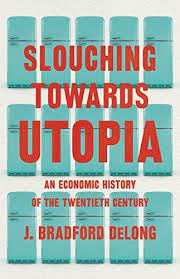You have /5 articles left.
Sign up for a free account or log in.
 Slouching Towards Utopia: An Economic History of the Twentieth Century by Bradford DeLong
Slouching Towards Utopia: An Economic History of the Twentieth Century by Bradford DeLong
Published in September 2022
Living through our current human-caused climate emergency while continuing to muddle our way through a global pandemic, it is sometimes difficult to believe in progress. Worries that the future will be worse than the present are an excellent reason to read economic histories such as Bradford DeLong’s new book, Slouching Towards Utopia.
Of all the statistics and data points that DeLong, a Berkeley economist, presents, this one stuck with me: in 1600, the average London laborer earned daily wages that enabled the purchase of the equivalent of 3,000 calories. By 1870, that same unskilled worker could provide 5,000 calories to himself and his family. Fast-forward to 2010, after the economic progress of what DeLong terms “the long twentieth century,” and that same worker could afford 2.4 million daily calories.
World history can be divided by the inflection point of pre- and post-1870. Pre-1870, deaths from disease and lack of food ran fairly evenly with births. Post-1870, technologically driven economic growth enabled a globally abundant food supply and advances such as antibiotics and sanitation, allowing the population to grow.
Crucially, that population growth has been accompanied by a drastic decline in extreme global poverty, defined as living on less than $2 (in constant dollars) a day. In 1870, eight in 10 people lived in extreme poverty. By 2010, that proportion had dropped to one in 10.
DeLong traces the roots of the long 20th century’s miraculous economic growth while also seeking to explain the causes of the Great Depression and the financial crisis of 2008. Credit for the post-1870 economic boom is given to the rise of the corporation and the research lab and the growth of global trade. While this story of long-term economic growth and shorter-term dislocations is primarily U.S.-based, DeLong also spends considerable time in Slouching Towards Utopia unpacking the causes behind the Soviet Union’s economic collapse and the rise of the Chinese communist/capitalist model.
How might this “grand narrative” of the economic history of the long 20th century help us think about our economic future? And given that you are reading Inside Higher Ed, what clues may be found about the future of higher education by reading Slouching Towards Utopia?
Part of the answer to both questions comes in the book’s title. DeLong asks how a world that has grown so rich as compared to 1870 can continue to allow so many to remain poor while also doing so little to address the existential dangers of human-caused climate change. Much of DeLong’s answers to these two questions come down to the faith policy makers and academics place in the market.
Suppose you believe that any interference in market mechanisms will always cause unintended negative consequences, as Friedrich von Hayek and all the economists who came after Hayek have preached. In that case, the market will continue to create both incredible wealth and high inequality.
Those with a more Keynesian orientation will tend to see market mechanisms as a tool to improve people’s lives rather than a set of truths that people must conform their behaviors around. For progressive (or even middle-of-the-road) economists, trade-offs between wealth concentration and a more environmentally sustainable and equitable economic development are well worth making, even if that choice requires government interference in the market.
One example of government interference in the market was the GI Bill of 1944. While the growth of mass higher education is not given a central role in DeLong’s reasons for rapid economic growth, other observers (including me) would put the expansion of postsecondary education as a key force in the postwar development of the American middle class.
Is it so hard to imagine a future where higher education is once again thought of as a public rather than a private good and where the federal government makes significant investments in our public higher education system?
Public reinvestment in higher education may not get us back on track to reaching utopia, but it would be a good place to start.
What are you reading?




